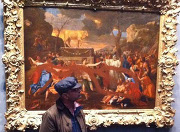 The National Gallery in London moves at its own pace. It’s generally not known for breaking news. Yet earlier today it grabbed headlines for all the wrong reasons. A fifty-seven year old man, walked into the gallery and spray-painted two pieces by the French Master, Nicholas Poussin.
The National Gallery in London moves at its own pace. It’s generally not known for breaking news. Yet earlier today it grabbed headlines for all the wrong reasons. A fifty-seven year old man, walked into the gallery and spray-painted two pieces by the French Master, Nicholas Poussin.
According to a report released earlier today, a gallery assistant came across a man as he sprayed red paint on the works. The damaged pieces were The Adoration of the Golden Calf (shown left) and The Adoration of the Shepherds. Both were painted around the same time, between 1633 and 1634. Police were called and the man was immediately arrested.
The Guardian provided an eye witness account:
Steven Dear, who was visiting the gallery with friends, said: “I heard a lot of gasping and turned around and saw him finishing spraying the larger painting. My reaction was to stop him doing any physical damage. I thought he might try to pull it off the wall.
“He was just stood there on his own. He seemed proud of what he had done, giving a verbal protest – some kind of explanation in French as to why he had done it – and then just standing there waiting to be arrested. At no point did he try to escape.
“The security guards then came over and snatched the paint cans from him, before clearing the room. It wasn’t obvious why he did it, perhaps it was some kind of protest. Maybe a protest at the nakedness of the painting. He covered it all.”
Galleries have a great appeal because they provide a chance to witness the detail of the work – its brushstrokes, its paint textures, its surface cracks, and its flaws and stains. These are the details that reproductions can never quite capture. It’s what drives us to galleries and museums in such large numbers for a chance to see “the real thing.” Those details are somewhat obscured under glass. If acts suchs as this one cannot be stopped by museum security we might lose the gallery experience as works are moved under glass.

Pingback: Will Leonardo Be Safe At The National Gallery? | The Belle Epoque - An Art Blog()